2022年中考英语二轮专题复习课件:题型二 语法选择(共有108张ppt)
文档属性
| 名称 | 2022年中考英语二轮专题复习课件:题型二 语法选择(共有108张ppt) | 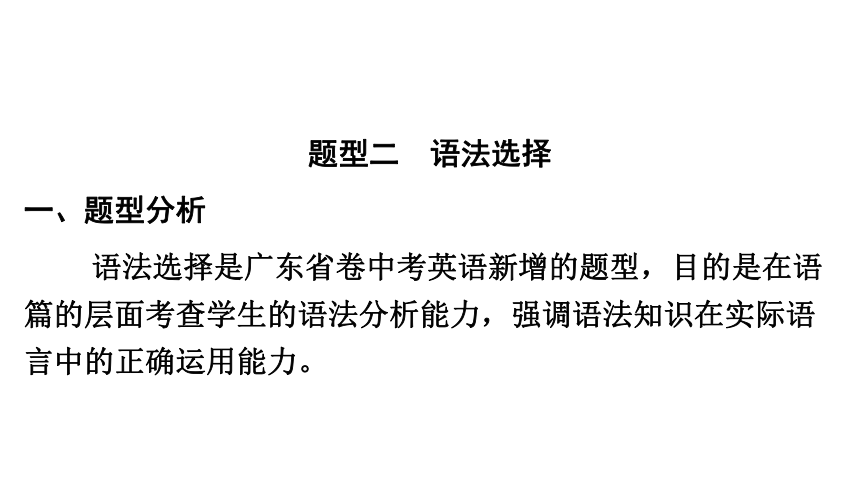 | |
| 格式 | zip | ||
| 文件大小 | 466.0KB | ||
| 资源类型 | 教案 | ||
| 版本资源 | 人教新目标(Go for it)版 | ||
| 科目 | 英语 | ||
| 更新时间 | 2022-03-14 14:50:47 | ||
图片预览

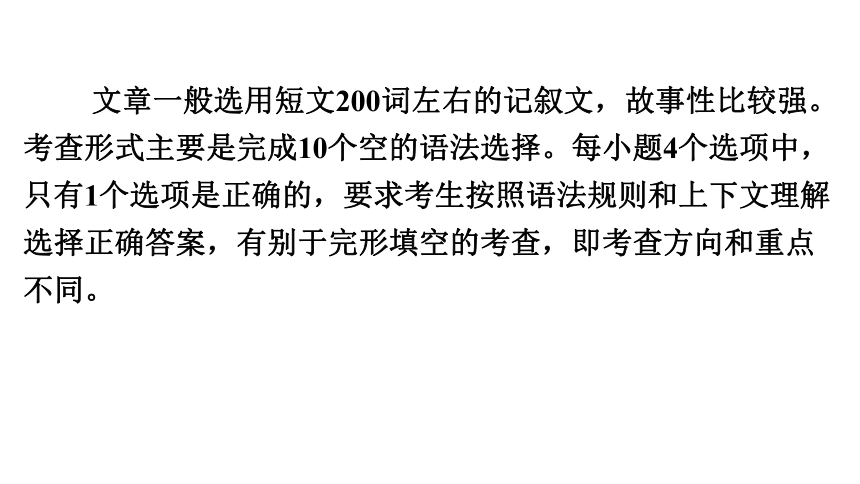
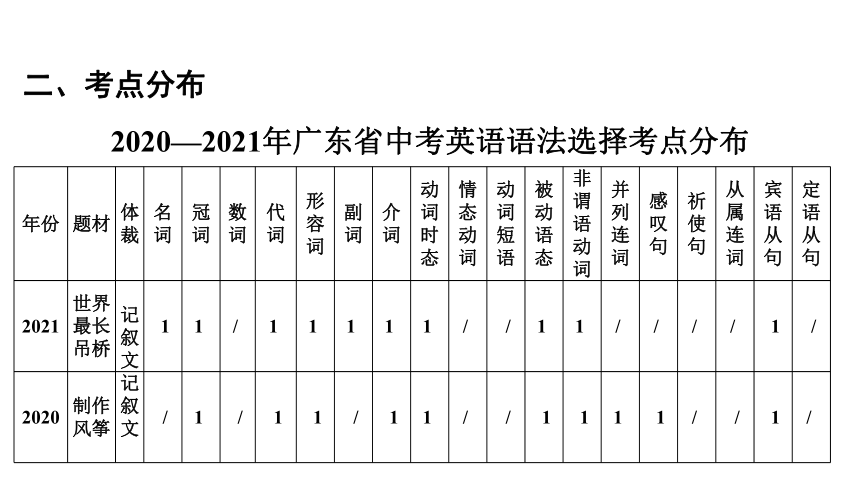
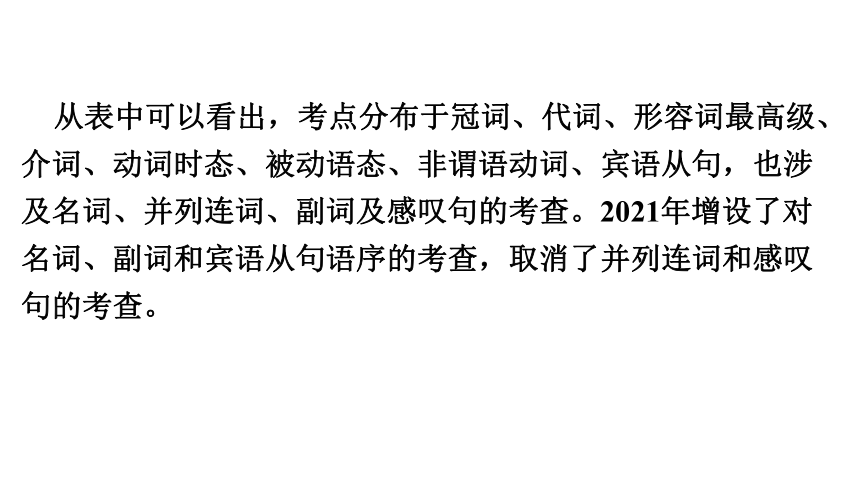
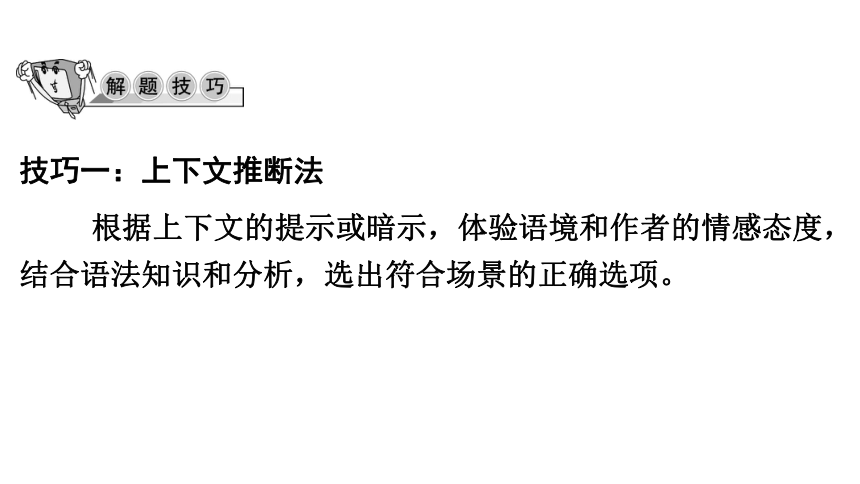
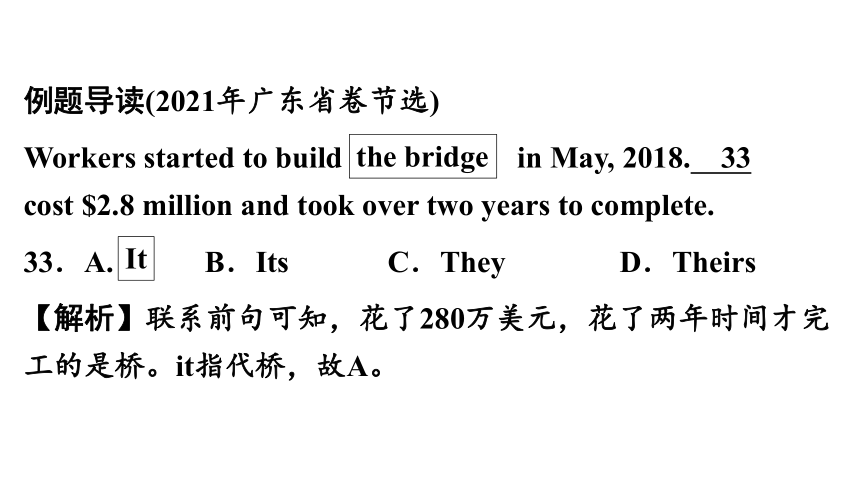
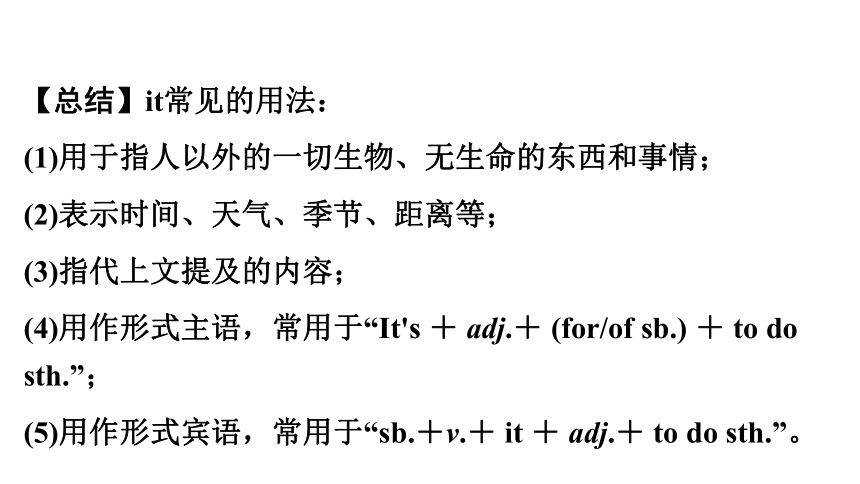
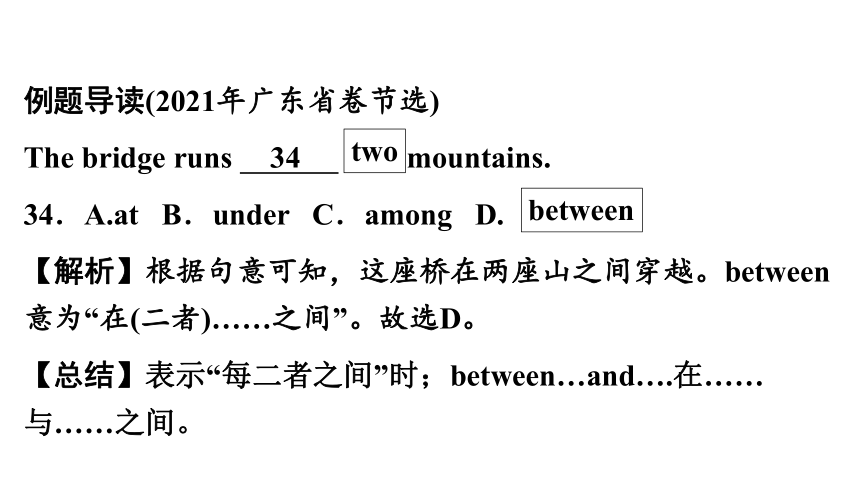
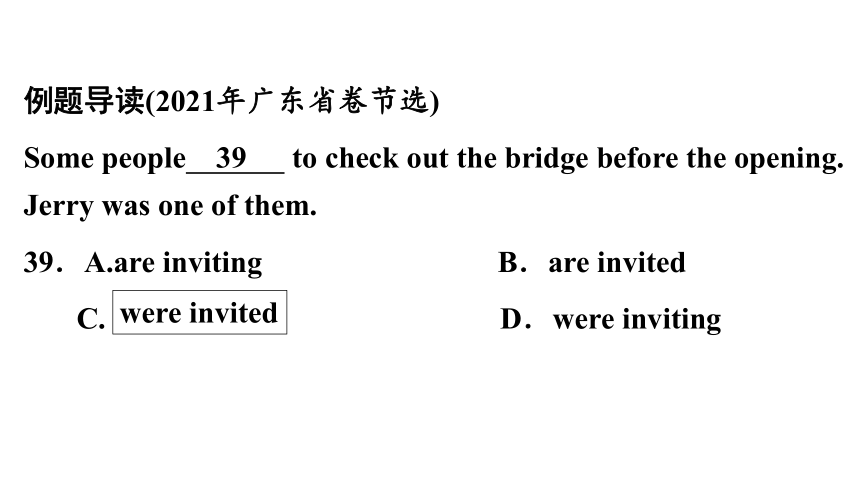
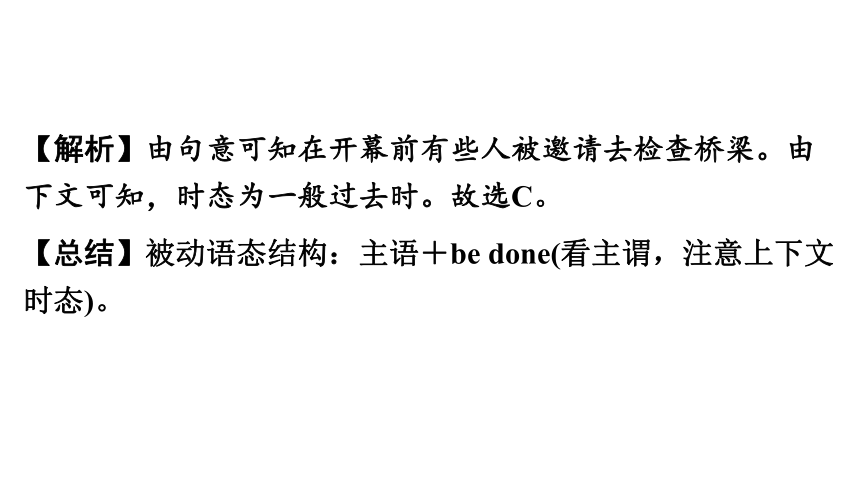
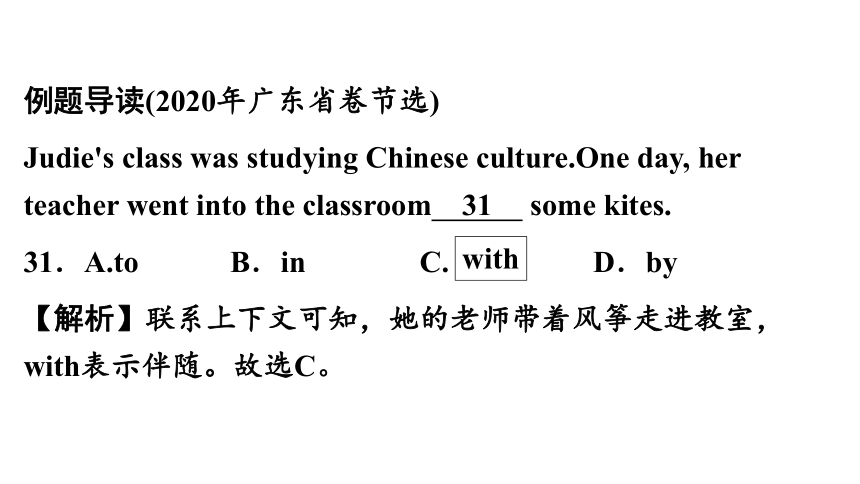
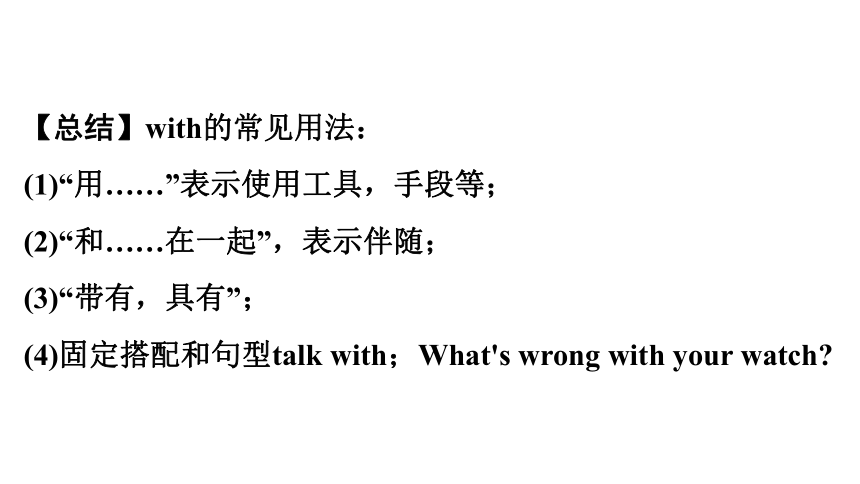
文档简介
(共108张PPT)
题型二 语法选择
一、题型分析
语法选择是广东省卷中考英语新增的题型,目的是在语篇的层面考查学生的语法分析能力,强调语法知识在实际语言中的正确运用能力。
文章一般选用短文200词左右的记叙文,故事性比较强。考查形式主要是完成10个空的语法选择。每小题4个选项中,只有1个选项是正确的,要求考生按照语法规则和上下文理解选择正确答案,有别于完形填空的考查,即考查方向和重点不同。
二、考点分布
2020—2021年广东省中考英语语法选择考点分布
年份 题材 体裁 名词 冠词 数词 代词 形容词 副词 介词 动词时态 情态动词 动词短语 被动语态 非谓语动词 并列连词 感叹句 祈使句 从属连词 宾语从句 定语从句
2021 世界最长吊桥 记叙文 1 1 / 1 1 1 1 1 / / 1 1 / / / / 1 /
2020 制作风筝 记叙文 / 1 / 1 1 / 1 1 / / 1 1 1 1 / / 1 /
从表中可以看出,考点分布于冠词、代词、形容词最高级、介词、动词时态、被动语态、非谓语动词、宾语从句,也涉及名词、并列连词、副词及感叹句的考查。2021年增设了对名词、副词和宾语从句语序的考查,取消了并列连词和感叹句的考查。
技巧一:上下文推断法
根据上下文的提示或暗示,体验语境和作者的情感态度,结合语法知识和分析,选出符合场景的正确选项。
例题导读(2021年广东省卷节选)
Workers started to build in May, 2018. 33 cost $2.8 million and took over two years to complete.
33.A. B.Its C.They D.Theirs
【解析】联系前句可知,花了280万美元,花了两年时间才完工的是桥。it指代桥,故A。
the bridge
It
【总结】it常见的用法:
(1)用于指人以外的一切生物、无生命的东西和事情;
(2)表示时间、天气、季节、距离等;
(3)指代上文提及的内容;
(4)用作形式主语,常用于“It's + adj.+ (for/of sb.) + to do sth.”;
(5)用作形式宾语,常用于“sb.+v.+ it + adj.+ to do sth.”。
例题导读(2021年广东省卷节选)
The bridge runs 34 mountains.
34.A.at B.under C.among D.
【解析】根据句意可知,这座桥在两座山之间穿越。between意为“在(二者)……之间”。故选D。
【总结】表示“每二者之间”时;between…and….在……与……之间。
two
between
例题导读(2021年广东省卷节选)
Some people 39 to check out the bridge before the opening. Jerry was one of them.
39.A.are inviting B.are invited
C. D.were inviting
were invited
【解析】由句意可知在开幕前有些人被邀请去检查桥梁。由下文可知,时态为一般过去时。故选C。
【总结】被动语态结构:主语+be done(看主谓,注意上下文时态)。
例题导读(2020年广东省卷节选)
Judie's class was studying Chinese culture.One day, her teacher went into the classroom 31 some kites.
31.A.to B.in C. D.by
【解析】联系上下文可知,她的老师带着风筝走进教室,with表示伴随。故选C。
with
【总结】with的常见用法:
(1)“用……”表示使用工具,手段等;
(2)“和……在一起”,表示伴随;
(3)“带有,具有”;
(4)固定搭配和句型talk with;What's wrong with your watch
例题导读(2020年广东省卷节选)
“What do you think of when you see a kite?” her dad asked.
Judie for a moment and , “Butterflies.”
36.A.answers B.answered
C.will answer D.has answered
thought
36
【解析】and用来连接两个并列谓语,看前后动词时态,thought是过去时,answer与其在同一时间段内发生。故选B。
【总结】语法选择中动词时态的解题方法:一看首句及上下文,二看前后动词时态,三看时间状语。
例题导读(2020年广东省卷节选)
Judie's dad agreed that it would be a good idea to make
….Next they stuck the paper on the cross. Finally they tied along tail to the bottom.
The next morning, they took 38 kite to the park and tested it.
38.A.a B.an C. D./
a butterfly kite
the
【解析】特指上文的a butterfly kite,第二次提到butterfly kite用定冠词the。故选C。
【总结】冠词的常见考法:
(1)首次出现且表示数量为一个的名词前,a+辅音音素,an+元音音素。
技巧二:句子成分分析法
结合语法知识,分析句子的各个成分,补充句子所缺的成分。语法选择中常考的句子成分有谓语(表示做动作的词)、宾语(动作的承受者)、定语(多为形容词)、状语(时间、地点、原因、结果、目的、条件、方式、程度等,多为副词)。
例题导读(2021年广东省卷节选)
how long 32 .It is 516 meters — over five football fields long.
32.A. B.is it C.it was D.was it
【解析】从句子成分分析可知,句子为主句+宾语从句形式,从句要求是陈述句语序。上下文看应为一般现在时。故选A。
Guess
it is
【总结】语法选择中宾语从句常考内容:
(1)引导宾语从句的连接代词和连接副词;
(2)宾语从句的语序要用陈述语序;
(3)宾语从句的时态要与主句的时态相呼应。
例题导读(2021年广东省卷节选)
He 40 , “I was a little afraid, but there's no other bridge like this one in the world. It was so worth it.”
40.A.excite B.excited
C. D.excitement
said
excitedly
【解析】本题考查副词的基本用法。即副词作状语,修饰行为动词。故选C。
【总结】副词与形容词的基本功能区别,形容词多作定语、表语及宾语补足语,副词多作状语,修饰行为动词,形容词、其他副词等。
例题导读(2020年广东省卷节选)
I each of you 33 a kite that means something important to you. You will have a 34 understanding of
kites before.
33.A.make B. C.making D.made
34.A.good B. C.best D.the best
expect
than
to make
better
【解析】从句子成分分析可知,第33小题为主语+动词(expect)+宾语+宾语补足语句式,考查动词作非谓语。故选B。第34小题,从than可知,需要用比较级。故选B。
【总结】完形填空中非谓语常考动词作宾语、目的状语和宾语补足语。形容词和副词常考比较级和最高级。
例题导读(2020年广东省卷节选)
Judie decided to ask her dad for help as it was 35 first
to make a kite.
35.A. B.herself C.hers D.she
【解析】形容词性物主代词+名词。故选A。
time
her
【总结】完形填空中常考的代词:
(1)代词的格。即作句子主语用主格,动词/介词后用宾语;
(2)形容词性物主代词+名词,名词性物主代词=形容词性物主代词+名词;
(3)反身代词,如enjoy oneself, help oneself,teach oneself等。
技巧三:固定搭配法
结合上下文并利用动词短语、介词短语及常用句型的固定搭配来选择正确选项。
例题导读(2021年广东省卷节选)
“Wow!” she cried proudly.“ 39 my butterfly flies!”
39.A.What B.What a C.What an D.
high
How
【解析】感叹句:How+adj./adv.+主语+动词!故选D。
【总结】感叹句句型:
(1)What+(a/an)+adj.+n.(+主语+谓语)!
(2)How+adj./adv.(+主语+谓语)!
建议一:掌握和熟练运用《课程标准》(2011版)中各语法点的基本结构和基本规则。
建议二:特别关注固定搭配、短语、同义词和近义词的辨析以及同根词的词性与含义。
建议三:平时多积累,多阅读文章,不断形成英语的语感,领悟文章中句子与句子之间的关系,把握段落之间的关系,并理解整篇文章。
建议四:加强练习,从中发现并掌握该类题目的规律,对自己不熟悉的、容易错的语法知识抓紧时间查漏补缺,提高做题的准确性。
Passage One (2021广东)
Last month, a new bridge was first opened to the public. It's 1 hanging bridge for walkers in the world. Guess how long 2 .It is 516 meters — over five football fields long.
Workers started to build the bridge in May, 2018. 3 cost $2.8 million and took over two years to complete. The
bridge runs 4 two mountains.At its highest point, it is 175 meters off the ground. Far, far below is a big rushing river. Along the river, there's 5 eight kilometer long wooden walkway. People could enjoy the scenery (风景) and watch 6 there.
Now, the city is hoping that the bridge 7 lots of tourists to the area. The website for the bridge describes the walk across the bridge as “the most exciting 516 meters of your life.”
Many tourists, they believe, will come 8 the fantastic experience of walking across. Some people 9 to check out the bridge before the opening. Jerry was one of them. He said 10 , “I was a little afraid, but there's no other bridge like this one in the world. It was so worth it.”
( ) 1.A.longer B.the longer
C.longest D.the longest
( ) 2.A.it is B.is it C.it was D.was it
( ) 3.A.It B.Its C.They D.Theirs
( ) 4.A.at B.under C.among D.between
( ) 5.A./ B.a C.an D.the
D
A
A
D
C
( ) 6.A.bird B.birds C.bird's D.birds’
( ) 7.A.brought B.will bring
C.is bringing D.was bringing
( ) 8.A.enjoy B.enjoyed C.enjoying D.to enjoy
( ) 9.A.are inviting B.are invited
C.were invited D.were inviting
( ) 10.A.excite B.excited C.excitedly D.excitement
B
B
D
C
C
Passage Two (2021广州)
There was once a farmer who had a large field of corn. He worked on it with the 1 care, but the corn was dying 2 there had been no rain for a long time. He felt very 3 .
One day, as he stood looking up at the sky, two little raindrops saw him. One said to the other, “Look at that farmer. I feel very sorry 4 him. He works so hard in the field, but now it 5 up. I wish I might help him.”
“Yes,” said the other, “ 6 you are only a little raindrop. You can't wet 7 one plant.”
“Well,” said the first, “I know I 8 do much, but perhaps I can cheer him a little. I'll go down to show my support, if I can't do 9 more. Here I go!”
The second one said, “Well, I think I can do that, 10 .Here I go!” So down went the two raindrops. One fell on the farmer's nose, and the other on a thirsty plant.
“What's that?” The farmer cried, “ 11 raindrop! I do believe we'll have a shower (阵雨) soon.”
By this time other raindrops had seen what 12 did. One said, “If you two are doing such a good job, I shall follow!” And down it went. “And I!” said 13 .“And I!” they all said, until a whole shower went down and the corn 14 all because one little raindrop tried its best 15 what it could.
( ) 1.A.great B.greater C.much greater D.greatest
( ) 2.A.because B.where C.when D.if
( ) 3.A.sad B.sadder C.sadly D.sadness
( ) 4.A.of B.on C.for D.with
( ) 5.A.dry B.is drying C.dried D.was drying
D
A
A
C
B
( ) 6.A.but B.so C.and D.though
( ) 7.A.just B.only C.even D.yet
( ) 8.A.needn't B.shouldn't C.mustn’t D.can’t
( ) 9.A.something B.everything
C.anything D.nothing
( ) 10.A.also B.too C.either D.neither
A
C
D
C
B
( ) 11.A.A B.An C.The D./
( ) 12.A.you B.they C.it D.he
( ) 13.A.others B.the other C.the others D.another
( ) 14.A.save B.saved C.is saved D.was saved
( ) 15.A.do B.doing C.to do D.did
A
B
D
D
C
Passage Three (2020广东)
Judie's class was studying Chinese culture. One day, her teacher went into the classroom 1 some kites. He told them that kites 2 in China more than 2,000 years ago. At the end of the class, he said, “The Chinese make kites that mean something important to them. I expect each of you 3 a kite that means something important to you. You will have a 4 understanding of kites than before.”
Judie decided to ask her dad for help as it was 5 first time to make a kite.
“What do you think of when you see a kite ” her dad asked.
Judie thought for a moment and 6 , “Butterflies.”
Judie's dad agreed that it would be a good idea to make a butterfly kite. They made across with some wood sticks, 7 then Judie painted a butterfly on a piece of white paper. Next
they stuck the paper on the cross. Finally they tied along tail to the bottom.
The next morning, they took 8 kite to the park and tested it. “Wow!” she cried proudly. “ 9 high my butterfly flies!”
“Judie, can you tell me 10 you like butterflies ” asked her dad.
Judie replied, “To me, butterflies mean beauty and freedom!”
( ) 1.A.to B.in C.with D.by
( ) 2.A.invent B.invented
C.are invented D.were invented
( ) 3.A.make B.to make C.making D.made
( ) 4.A.good B.better C.best D.the best
( ) 5.A.her B.herself C.hers D.she
C
D
B
B
A
( ) 6.A.answers B.answered
C.will answer D.has answered
( ) 7.A.and B.but C.or D.so
( ) 8.A.a B.an C.the D./
( ) 9.A.What B.What a C.What an D.How
( ) 10.A.why B.which C.what D.when
B
A
C
D
A
Passage Four (2020广州)
Deep in the forest lives David,who loves books.As soon as he reads one book,he brings home 1 .Soon the house 2 books. His wife,Alice,is angry. “You 3 do something!”
David thinks hard and has 4 idea. “I can bring my books into the faraway hills and share 5 I have with the children.”
Every week,David sets off across the countryside to faraway villages with his two donkeys. Early 6 a sunny morning,David and his donkeys stop at a river 7 .Then,from deep in the shadows,a bandit (山贼)jumps out! “Please let us pass,” David says, “The children 8 .” The bandit takes one book and shouts, “Next time I want 9 !”
They move on until at last,David sees some houses below. The children run to meet 10 .David reads them a story first. 11 the story ends,it's time for everyone to choose a book. The children hold their books close as they say good bye and run home 12 .David and his donkeys head back,over and around the hills,and into the sunset.
At home,Alice feeds her hungry husband and the donkeys. But then,instead of 13 ,David picks up his book, 14 reads deep into the night. And far away in the hills,candles and lanterns burn as the children read borrowed books deep into their night, 15 .
( )1.A.other B.another
C.the other D.the others
( )2.A.fills with B.filled with
C.is filled with D.was filled with
( )3.A.must B.could C.would D.may
( )4.A.a B.an C.the D./
( )5.A.what B.who C.why D.how
B
C
A
B
A
( )6.A.in B.on C.at D.for
( )7.A.drink B.drinking C.drinks D.to drink
( )8.A.wait B.waited
C.are waiting D.have waited
( )9.A.some money B.any money
C.some moneys D.any moneys
( )10.A.he B.his C.him D.himself
B
D
C
A
C
( )11.A.Before B.When C.If D.Because
( )12.A.cheer B.cheerful
C.cheerfully D.more cheerful
( )13.A.sleep B.slept C.sleeps D.sleeping
( )14.A.and B.but C.or D.so
( )15.A.either B.neither C.also D.too
B
C
D
A
D
Passage Five (2019广州)
The first astronauts
Since the earliest times,people have looked up at the stars,the moon and the planets. Today people use modern machines 1 at the sky. This is very different from the situation 2 years ago when people could only use their eyes. Perhaps they dreamed of 3 the universe.
When did humans first go into space The story began not so very long ago, 4 the first astronauts were not people—they were animals.
Scientists wanted to make travelling to space as 5 as possible for humans. So they decided to experiment with animals and test 6 in spaceflights. Insects,mice,frogs,dogs and monkeys were some of the animals 7 first went into space. Many of them 8 ,but they helped to make
space travel safer for humans. For their great service,we 9 forget these animals.
Albert II was the first monkey to go into space in 1949. Sadly he died 10 his spaceship landed back on Earth.
11 the result was different for Ham the Monkey. His story ended happily when he return to earth 12 very good health.
Scientists wanted to know the answer to the important question: could 13 animal like Ham do the same things in space as he could do on Earth The answer came when Ham 14 into space in 1961. Yes,he did everything well and lived for 15 16 years.
( )1.A.look B.to look C.looking D.looked
( )2.A.thousand B.thousands
C.thousand of D.thousands of
( )3.A.explore B.to explore
C.explored D.exploring
( )4.A.as B.or C.but D.so
( )5.A.safe B.safer C.safest D.the safest
B
D
D
A
A
( )6.A.they B.them C.their D.theirs
( )7.A.whom B.what C.that D.whose
( )8.A.die B.died C.have died D.will die
( )9.A.shouldn't B.may not
C.don't have to D.needn’t
( )10.A.if B.because C.after D.since
B
C
B
A
C
( )11.A.Lucky B.Luckier C.Luck D.Luckily
( )12.A.at B.on C.in D.for
( )13.A.a B.an C.the D./
( )14.A.send B.sent C.is sent D.was sent
( )15.A.another B.other
C.others D.the others
D
C
B
D
A
Passage Six (2018广州)
Xian Xinghai was a very famous musician in China. He wrote one of the greatest pieces of music of the 20th century. In his short life he wrote 1 300 songs and an opera.
Xian was born in Panyu, Guangdong, China in 1905. Because his father died before he was born, Xian moved from place to place with 2 mother. He began learning to play 3 violin when he was 13 years old. In the beginning,
his violin was 4 cheap and badly made that he 5 not play it well. His friends laughed at him. Xian did not stop
6 and soon showed his talent. In 1934, he was one of the first Chinese students 7 studied in a special music school in Paris. Before he 8 , Xian became the school's best student 9 won several prizes for his talents.
In 1935, he returned to China and helped fight against the Japanese army. Later, he came to Yan'an 10 music at a college. 11 there were no pianos in Yan'an at that time, Xian still wrote 12 of his most important music there, including the Yellow River Cantata, his most famous work.
In May 1940, Xian 13 to the Soviet Union by the Chinese Communist Party to write music for movies. In the Soviet Union, life was very 14 .Xian got sick and later died of a lung illness 15 October 30, 1945, aged only 40. Xian's music, however, lives on in the people's hearts.
( ) 1.A.near B.nearly C.nearby D.nearer
( ) 2.A.he B.him C.his D.he’s
( ) 3.A.a B.an C.the D.this
( ) 4.A.so B.such C.very D.much
( ) 5.A.need B.may C.should D.could
B
C
C
A
D
( ) 6.A.practise B.practising
C.to practise D.practised
( ) 7.A.what B.which C.whom D.who
( ) 8.A.leave B.leaves C.left D.was leaving
( ) 9.A.and B.but C.as D.or
( ) 10.A.teach B.taught C.teaching D.to teach
B
D
C
A
D
( ) 11.A.If B.Although C.When D.Because
( ) 12.A.any B.little C.few D.some
( ) 13.A.sent B.was sent
C.has sent D.was sending
( ) 14.A.hard B.harder C.hardest D.the hardest
( ) 15.A.at B.in C.on D.by
B
D
B
A
C
Passage One
One Sunday, I decided to tidy my bookshelf up. 1 envelope fell to the floor suddenly. 2 surprised I was! I couldn't remember putting the envelope on 3 shelf. I opened the envelope carefully. In it, there was a letter written by my mom.
My dear children,
I love you so much! I hope that the letter 4 by you one day. Yes, I just want 5 you know something that I think is not suitable to express face to face.
Life is too short and uncertain. What I say is not new at all, 6 why I say it is important. If you are reading this, I am no longer with you. As I'm not there to help you, I'm worrying about 7 you can take the sound and wise steps in the future.
The world around you can be confusing. But if you look inside yourself, you 8 your path to where you should go. Be as 9 as possible and aware of every step. Be kind to others and yourself.
Yours affectionately,
Mom
I was silent 10 a long time, holding that letter. I thought about how much I loved and missed my mother.
( ) 1.A.A B.An C.The D./
( ) 2.A.What B.What a C.How a D.How
( ) 3.A.my B.myself C.mine D.me
( ) 4.A.find B.found C.was found D.will be found
( ) 5.A.let B.to let C.letting D.lets
B
D
A
D
B
( ) 6.A.and B.but C.or D.so
( ) 7.A.whether B.why C.when D.where
( ) 8.A.light B.lit C.will light D.has lit
( ) 9.A.careful B.more careful
C.most careful D.the most careful
( ) 10.A.in B.after C.over D.for
B
A
C
A
D
Passage Two
A group of adults, highly succeeded in their jobs, went to visit their old professor. Soon they began to complain (抱怨) about the stress (压力) and problems in work and life.
The professor went to the kitchen and returned 1 a pot of coffee and all kinds of cups: glass, plastic; some nice looking, some plain looking; some were expensive, some were cheap. He told them to help 2 to the coffee.
When each had a cup of coffee, the professor said, “I've noticed all the nice looking, expensive cups 3 up, leaving behind the plain and cheap ones. It is normal for you to take the best, that is 4 root of your problem and stress. You know the cup itself adds no quality to the coffee. And 5 you really wanted was coffee, not the cup, but you all went for the best 6 .”
Life is the coffee, jobs, money and position in society are the cups. They are 7 tools to hold life, and the type of cup 8 change the quality of our life. By paying attention only to the cup, we fail 9 the coffee. God has provided us. Please enjoy your coffee!
The 10 people don't have the best of everything. They just make the best of everything. Live simply. Love sincerely. Care deeply. Speak kindly.
( ) 1.A.for B.in C.with D.at
( ) 2.A.them B.their C.theirs D.themselves
( ) 3.A.were taken B.took
C.have taken D.were taking
( ) 4.A.a B.an C.the D./
( ) 5.A.that B.what C.who D.how
C
D
A
C
B
( ) 6.A.cup B.cups C.cup’s D.cups’
( ) 7.A.also B.even C.still D.just
( ) 8.A.doesn't B.don’t C.didn’t D.won’t
( ) 9.A.enjoy B.enjoyed C.enjoying D.to enjoy
( ) 10.A.happy B.happier C.happiest D.happily
B
D
A
D
C
Passage Three
It is reported that over 300 million people in China are suffering from nearsightedness (近视).As more children have got eyesight trouble, 1 parents hope to solve the problem in some different ways, for example, by 2 the ways when children read and sit.But one should start with 3 exercise from one's feet in fact. Three ways on how to protect are as follows:
First, don't tie your shoes too closely. Try to wear comfortable and soft shoes and socks 4 you walk outside. Walk 5 shoes or socks at home. While you are traveling, try to wear cloth shoes in order to make your blood circulation (循环) 6 .
Second,walking on tiptoes (脚尖) 7 help improve one's eyesight. Studies show that most of the ballet (芭蕾舞) performers' eyesight is good.
Third,rope skipping (跳绳) also 8 good to one's eyesight. When skipping the rope, one has to move quickly, which makes both the brain as well as the eyes 9 .It may also make one grow taller.
Besides foot exercises, it is good to pull one's ears. Pulling the ears 20 times quickly 10 to be a good way to reduce the pressure (压力) on one's eyes soon. It can keep one's eyes healthy.
( ) 1.A.their B.theirs C.they D.them
( ) 2.A.correct B.to correct
C.corrected D.correcting
( ) 3.A.a B.an C.the D./
( ) 4.A.when B.because C.unless D.though
( ) 5.A.in B.on C.without D.over
( ) 6.A.fast B.faster C.fastest D.the fastest
A
D
C
A
C
B
( ) 7.A.can B.may
C.must D.need
( ) 8.A.do B.does C.is doing D.has done
( ) 9.A.excite B.exciting
C.excited D.excitement
( ) 10.A.find B.finds
C.found D.is found
A
B
C
D
Passage Four
When you were young, who flew kites with you in the park Who taught you how 1 football Who helped you work out 2 first difficult math problem Your dad. So why not do something to thank your dad
This idea of Father's Day 3 from an American lady called Sonora Dodd in 1909. She wanted a special day to honor her father. He raised six children by himself 4 after his
wife died during the birth of their sixth child. Sonora thought there needed to be a day to honour great and loving 5 .Her father was born on June 19. So she chose to hold the first Father's Day celebration 6 his birthday in 1910. In 1924, the US president Calvin Coolidge liked the idea of a national Father's Day. Finally, in 1966, the third Sunday in June 7 Father's Day.
There are many ways to show your love and thanks to your father. Think about what 8 choose to make him laugh happily. A small present, such as a photo of your family, can make him feel 9 .Send him flowers—the red rose is the official Father's Day flower. If he has 10 iPad, cover it with words like “I love you, Dad!”
( ) 1.A.to play B.play C.played D.playing
( ) 2.A.you B.your C.yours D.yourself
( ) 3.A.come B.will come C.have come D.came
( ) 4.A.difficult B.difficultly
C.difficulty D.difficulties
( ) 5.A.dad B.dad’s C.dads’ D.dads
A
B
D
B
D
( ) 6.A.in B.on C.at D.from
( ) 7.A.make B.was made C.is made D.was making
( ) 8.A.you can B.can you C.you could D.could you
( ) 9.A.good B.well C.better D.best
( ) 10.A.a B.an C.the D./
B
B
A
A
B
Passage Five
I'm Michael. I can speak English very well though I live in Poland. And Polish is my 1 language. Now I want to share my experience with 2 .
I started to learn English 3 listening to English songs when I was six. My dad encouraged me to listen to The Beatles 4 .But in the beginning, I could understand nothing of 5 they were singing. Then I got a book with the
words of all the songs.I read 6 book again and again. I learned most of the songs by heart. I sang them to my dad. Still, it took me a lot of time 7 the meaning of the songs.
Learning English well to understand The Beatles became one of my dreams.
When I was 13 years old, I started reading science fiction books. I read them in Polish at first. All of the books 8 from English.
I hoped I could read the books in English. I felt that the books in English would be even 9 .I decided to read the books in English. This decision guided me for many years.
Today, I have become good at English and I can understand many English songs and books. English 10 me so much satisfaction and pleasure.
( ) 1.A.mother B.mothers C.mother's D.mothers’
( ) 2.A.you B.yours C.yourself D.yourselves
( ) 3.A.at B.on C.in D.by
( ) 4.A.careful B.careless C.carefully D.carelessly
( ) 5.A.who B.what C.when D.where
A
A
D
C
B
( ) 6.A.a B.an C.the D./
( ) 7.A.to understand B.understanding
C.understand D.understood
( ) 8.A.translate B.have translated
C.are translated D.were translated
C
A
D
( ) 9.A.interesting B.interested
C.more interesting D.the most interesting
( ) 10.A.gave B.was given
C.has given D.will give
C
C
Passage Six
Tourists these days are crowding into the Nanjing Hongshan Forest Zoo to see a monkey that looks like Beckham,one of the most famous football players in the world. The lovely 1 monkey has become the zoo's own new celebrity (名人).The monkey has a lot of 2 , and she looks a lot like David Beckham. So a large number of tourists are rushing into
the zoo to see her. Zookeepers are 3 at the resemblance (相似) between the little monkey and Beckham. So they give the little monkey 4 very special name—Harper Seven,that football star's little daughter’s.
In fact, Seven, the lovely monkey, 5 alone as soon as she was born. Her mother died. She was very tiny when she first arrived 6 the zoo. Luckily, the zookeepers quickly stepped to care for her. Seven wasn't accepted into an existing
(现有的) group. So the keepers had to raise 7 separately. Now the zookeepers decide 8 Seven live on her own. The keepers are satisfied with 9 she does in it.She enjoys playing with people very much. So far, she 10 millions of fans from all over the world, just like Beckham.
( ) 1.A.six months old B.six month old
C.six months old D.six month old
( ) 2.A.hair B.hairs C.hair’s D.hairs’
( ) 3.A.surprised B.surprisedly
C.surprising D.surprise
( ) 4.A.the B.an C.a D./
( ) 5.A.leaves B.left C.is left D.was left
B
A
A
C
D
( ) 6.A.in B.at C.around D.near
( ) 7.A.she B.her C.hers D.herself
( ) 8.A.let B.lets C.to let D.letting
( ) 9.A.how B.when C.why D.what
( ) 10.A.gets B.got C.has got D.will get
B
B
C
D
C
Passage Seven
Do you know astronauts' everyday life in space They also need to eat, work, exercise and relax. They do the same thing 1 us, but they do them differently.
Gravity 2 or almost everything will fly away. On the earth, we put food on a plate and gravity (重力) holds 3 food down. But there is almost no gravity in space and food can fly away, so astronauts must have a 4 eating and drinking.
Sleeping is very different in space.Some astronauts like to float (漂浮) in the air, but most astronauts say 5 they like to be in a sleeping bag. They tie (系) the bag to a wall so that they 6 away at night.
Exercise is very important in space. On the earth, your legs carry your body, 7 in space, astronauts float, so they do not use their legs often.This is very bad for 8 legs, so they must exercise for thirty minutes every day.
After a day's work, astronauts 9 wait to relax. They may listen to music, read, watch films, play games, or spend a few minutes talking to their friends and family on the radio. Sometimes they only want 10 in the air.
( ) 1.A.as B.with C.for D.from
( ) 2.A.needs B.needed C.is needed D.was needed
( ) 3.A.a B.an C.the D./
( ) 4.A.careful B.careless C.carefully D.carelessly
( ) 5.A.when B.if C.why D.that
A
C
C
A
D
( ) 6.A.don't flow B.won't float
C.didn't flow D.aren't flowing
( ) 7.A.but B.so C.or D.and
( ) 8.A.they B.theirs C.them D.their
( ) 9.A.can’t B.may not C.mustn’t D.needn’t
( ) 10.A.float B.to float C.floating D.floats
B
A
D
A
B
Passage Eight
Once John and Mary were asked to go on a business trip. So they found a babysitter to take care 1 the children.
A week later, as they drove into their hometown, they noticed smoke and went to see 2 .A house was on fire! Mary said, “Well, the house isn't ours. Let's go.”
But John kept driving 3 , “The house belongs to Fred.” “It has nothing to do with us. Let's go,” said Mary.
But John drove up. A woman was crying in the street, “My children! Help! Help!” John asked her 4 him where her children were. “In the bathroom,” cried the woman.
John hurried for the bathroom with full of smoke and heat. As he left the bathroom with two children, he 5 that two more children were still inside. He 6 sent the two children to a safe place. But Mary shouted, “Don't go back! That house 7 down in any second!”
John went back. It seemed a century had passed before he found both the children 8 the return way. As he walked up the endless steps, 9 thought went through his mind
that there was something strangely familiar about the little bodies, and when they came out, he found that he had just saved 10 own children!
The babysitter had left them at this house while she did some shopping.
( ) 1.A.of B.for C.on D.about
( ) 2.A.what is it B.what it is
C.what was it D.what it was
( ) 3.A.close B.closer C.closest D.the closest
( ) 4.A.shows B.showed C.to show D.showing
( ) 5.A.tells B.told C.has told D.was told
A
D
A
C
D
( ) 6.A.quick B.quickly C.quickness D.quicken
( ) 7.A.falls B.fell C.will fall D.was falling
( ) 8.A.and B.but C.so D.or
( ) 9.A.a B.an C.the D./
( ) 10.A.he B.his C.him D.himself
B
C
A
C
B
题型二 语法选择
一、题型分析
语法选择是广东省卷中考英语新增的题型,目的是在语篇的层面考查学生的语法分析能力,强调语法知识在实际语言中的正确运用能力。
文章一般选用短文200词左右的记叙文,故事性比较强。考查形式主要是完成10个空的语法选择。每小题4个选项中,只有1个选项是正确的,要求考生按照语法规则和上下文理解选择正确答案,有别于完形填空的考查,即考查方向和重点不同。
二、考点分布
2020—2021年广东省中考英语语法选择考点分布
年份 题材 体裁 名词 冠词 数词 代词 形容词 副词 介词 动词时态 情态动词 动词短语 被动语态 非谓语动词 并列连词 感叹句 祈使句 从属连词 宾语从句 定语从句
2021 世界最长吊桥 记叙文 1 1 / 1 1 1 1 1 / / 1 1 / / / / 1 /
2020 制作风筝 记叙文 / 1 / 1 1 / 1 1 / / 1 1 1 1 / / 1 /
从表中可以看出,考点分布于冠词、代词、形容词最高级、介词、动词时态、被动语态、非谓语动词、宾语从句,也涉及名词、并列连词、副词及感叹句的考查。2021年增设了对名词、副词和宾语从句语序的考查,取消了并列连词和感叹句的考查。
技巧一:上下文推断法
根据上下文的提示或暗示,体验语境和作者的情感态度,结合语法知识和分析,选出符合场景的正确选项。
例题导读(2021年广东省卷节选)
Workers started to build in May, 2018. 33 cost $2.8 million and took over two years to complete.
33.A. B.Its C.They D.Theirs
【解析】联系前句可知,花了280万美元,花了两年时间才完工的是桥。it指代桥,故A。
the bridge
It
【总结】it常见的用法:
(1)用于指人以外的一切生物、无生命的东西和事情;
(2)表示时间、天气、季节、距离等;
(3)指代上文提及的内容;
(4)用作形式主语,常用于“It's + adj.+ (for/of sb.) + to do sth.”;
(5)用作形式宾语,常用于“sb.+v.+ it + adj.+ to do sth.”。
例题导读(2021年广东省卷节选)
The bridge runs 34 mountains.
34.A.at B.under C.among D.
【解析】根据句意可知,这座桥在两座山之间穿越。between意为“在(二者)……之间”。故选D。
【总结】表示“每二者之间”时;between…and….在……与……之间。
two
between
例题导读(2021年广东省卷节选)
Some people 39 to check out the bridge before the opening. Jerry was one of them.
39.A.are inviting B.are invited
C. D.were inviting
were invited
【解析】由句意可知在开幕前有些人被邀请去检查桥梁。由下文可知,时态为一般过去时。故选C。
【总结】被动语态结构:主语+be done(看主谓,注意上下文时态)。
例题导读(2020年广东省卷节选)
Judie's class was studying Chinese culture.One day, her teacher went into the classroom 31 some kites.
31.A.to B.in C. D.by
【解析】联系上下文可知,她的老师带着风筝走进教室,with表示伴随。故选C。
with
【总结】with的常见用法:
(1)“用……”表示使用工具,手段等;
(2)“和……在一起”,表示伴随;
(3)“带有,具有”;
(4)固定搭配和句型talk with;What's wrong with your watch
例题导读(2020年广东省卷节选)
“What do you think of when you see a kite?” her dad asked.
Judie for a moment and , “Butterflies.”
36.A.answers B.answered
C.will answer D.has answered
thought
36
【解析】and用来连接两个并列谓语,看前后动词时态,thought是过去时,answer与其在同一时间段内发生。故选B。
【总结】语法选择中动词时态的解题方法:一看首句及上下文,二看前后动词时态,三看时间状语。
例题导读(2020年广东省卷节选)
Judie's dad agreed that it would be a good idea to make
….Next they stuck the paper on the cross. Finally they tied along tail to the bottom.
The next morning, they took 38 kite to the park and tested it.
38.A.a B.an C. D./
a butterfly kite
the
【解析】特指上文的a butterfly kite,第二次提到butterfly kite用定冠词the。故选C。
【总结】冠词的常见考法:
(1)首次出现且表示数量为一个的名词前,a+辅音音素,an+元音音素。
技巧二:句子成分分析法
结合语法知识,分析句子的各个成分,补充句子所缺的成分。语法选择中常考的句子成分有谓语(表示做动作的词)、宾语(动作的承受者)、定语(多为形容词)、状语(时间、地点、原因、结果、目的、条件、方式、程度等,多为副词)。
例题导读(2021年广东省卷节选)
how long 32 .It is 516 meters — over five football fields long.
32.A. B.is it C.it was D.was it
【解析】从句子成分分析可知,句子为主句+宾语从句形式,从句要求是陈述句语序。上下文看应为一般现在时。故选A。
Guess
it is
【总结】语法选择中宾语从句常考内容:
(1)引导宾语从句的连接代词和连接副词;
(2)宾语从句的语序要用陈述语序;
(3)宾语从句的时态要与主句的时态相呼应。
例题导读(2021年广东省卷节选)
He 40 , “I was a little afraid, but there's no other bridge like this one in the world. It was so worth it.”
40.A.excite B.excited
C. D.excitement
said
excitedly
【解析】本题考查副词的基本用法。即副词作状语,修饰行为动词。故选C。
【总结】副词与形容词的基本功能区别,形容词多作定语、表语及宾语补足语,副词多作状语,修饰行为动词,形容词、其他副词等。
例题导读(2020年广东省卷节选)
I each of you 33 a kite that means something important to you. You will have a 34 understanding of
kites before.
33.A.make B. C.making D.made
34.A.good B. C.best D.the best
expect
than
to make
better
【解析】从句子成分分析可知,第33小题为主语+动词(expect)+宾语+宾语补足语句式,考查动词作非谓语。故选B。第34小题,从than可知,需要用比较级。故选B。
【总结】完形填空中非谓语常考动词作宾语、目的状语和宾语补足语。形容词和副词常考比较级和最高级。
例题导读(2020年广东省卷节选)
Judie decided to ask her dad for help as it was 35 first
to make a kite.
35.A. B.herself C.hers D.she
【解析】形容词性物主代词+名词。故选A。
time
her
【总结】完形填空中常考的代词:
(1)代词的格。即作句子主语用主格,动词/介词后用宾语;
(2)形容词性物主代词+名词,名词性物主代词=形容词性物主代词+名词;
(3)反身代词,如enjoy oneself, help oneself,teach oneself等。
技巧三:固定搭配法
结合上下文并利用动词短语、介词短语及常用句型的固定搭配来选择正确选项。
例题导读(2021年广东省卷节选)
“Wow!” she cried proudly.“ 39 my butterfly flies!”
39.A.What B.What a C.What an D.
high
How
【解析】感叹句:How+adj./adv.+主语+动词!故选D。
【总结】感叹句句型:
(1)What+(a/an)+adj.+n.(+主语+谓语)!
(2)How+adj./adv.(+主语+谓语)!
建议一:掌握和熟练运用《课程标准》(2011版)中各语法点的基本结构和基本规则。
建议二:特别关注固定搭配、短语、同义词和近义词的辨析以及同根词的词性与含义。
建议三:平时多积累,多阅读文章,不断形成英语的语感,领悟文章中句子与句子之间的关系,把握段落之间的关系,并理解整篇文章。
建议四:加强练习,从中发现并掌握该类题目的规律,对自己不熟悉的、容易错的语法知识抓紧时间查漏补缺,提高做题的准确性。
Passage One (2021广东)
Last month, a new bridge was first opened to the public. It's 1 hanging bridge for walkers in the world. Guess how long 2 .It is 516 meters — over five football fields long.
Workers started to build the bridge in May, 2018. 3 cost $2.8 million and took over two years to complete. The
bridge runs 4 two mountains.At its highest point, it is 175 meters off the ground. Far, far below is a big rushing river. Along the river, there's 5 eight kilometer long wooden walkway. People could enjoy the scenery (风景) and watch 6 there.
Now, the city is hoping that the bridge 7 lots of tourists to the area. The website for the bridge describes the walk across the bridge as “the most exciting 516 meters of your life.”
Many tourists, they believe, will come 8 the fantastic experience of walking across. Some people 9 to check out the bridge before the opening. Jerry was one of them. He said 10 , “I was a little afraid, but there's no other bridge like this one in the world. It was so worth it.”
( ) 1.A.longer B.the longer
C.longest D.the longest
( ) 2.A.it is B.is it C.it was D.was it
( ) 3.A.It B.Its C.They D.Theirs
( ) 4.A.at B.under C.among D.between
( ) 5.A./ B.a C.an D.the
D
A
A
D
C
( ) 6.A.bird B.birds C.bird's D.birds’
( ) 7.A.brought B.will bring
C.is bringing D.was bringing
( ) 8.A.enjoy B.enjoyed C.enjoying D.to enjoy
( ) 9.A.are inviting B.are invited
C.were invited D.were inviting
( ) 10.A.excite B.excited C.excitedly D.excitement
B
B
D
C
C
Passage Two (2021广州)
There was once a farmer who had a large field of corn. He worked on it with the 1 care, but the corn was dying 2 there had been no rain for a long time. He felt very 3 .
One day, as he stood looking up at the sky, two little raindrops saw him. One said to the other, “Look at that farmer. I feel very sorry 4 him. He works so hard in the field, but now it 5 up. I wish I might help him.”
“Yes,” said the other, “ 6 you are only a little raindrop. You can't wet 7 one plant.”
“Well,” said the first, “I know I 8 do much, but perhaps I can cheer him a little. I'll go down to show my support, if I can't do 9 more. Here I go!”
The second one said, “Well, I think I can do that, 10 .Here I go!” So down went the two raindrops. One fell on the farmer's nose, and the other on a thirsty plant.
“What's that?” The farmer cried, “ 11 raindrop! I do believe we'll have a shower (阵雨) soon.”
By this time other raindrops had seen what 12 did. One said, “If you two are doing such a good job, I shall follow!” And down it went. “And I!” said 13 .“And I!” they all said, until a whole shower went down and the corn 14 all because one little raindrop tried its best 15 what it could.
( ) 1.A.great B.greater C.much greater D.greatest
( ) 2.A.because B.where C.when D.if
( ) 3.A.sad B.sadder C.sadly D.sadness
( ) 4.A.of B.on C.for D.with
( ) 5.A.dry B.is drying C.dried D.was drying
D
A
A
C
B
( ) 6.A.but B.so C.and D.though
( ) 7.A.just B.only C.even D.yet
( ) 8.A.needn't B.shouldn't C.mustn’t D.can’t
( ) 9.A.something B.everything
C.anything D.nothing
( ) 10.A.also B.too C.either D.neither
A
C
D
C
B
( ) 11.A.A B.An C.The D./
( ) 12.A.you B.they C.it D.he
( ) 13.A.others B.the other C.the others D.another
( ) 14.A.save B.saved C.is saved D.was saved
( ) 15.A.do B.doing C.to do D.did
A
B
D
D
C
Passage Three (2020广东)
Judie's class was studying Chinese culture. One day, her teacher went into the classroom 1 some kites. He told them that kites 2 in China more than 2,000 years ago. At the end of the class, he said, “The Chinese make kites that mean something important to them. I expect each of you 3 a kite that means something important to you. You will have a 4 understanding of kites than before.”
Judie decided to ask her dad for help as it was 5 first time to make a kite.
“What do you think of when you see a kite ” her dad asked.
Judie thought for a moment and 6 , “Butterflies.”
Judie's dad agreed that it would be a good idea to make a butterfly kite. They made across with some wood sticks, 7 then Judie painted a butterfly on a piece of white paper. Next
they stuck the paper on the cross. Finally they tied along tail to the bottom.
The next morning, they took 8 kite to the park and tested it. “Wow!” she cried proudly. “ 9 high my butterfly flies!”
“Judie, can you tell me 10 you like butterflies ” asked her dad.
Judie replied, “To me, butterflies mean beauty and freedom!”
( ) 1.A.to B.in C.with D.by
( ) 2.A.invent B.invented
C.are invented D.were invented
( ) 3.A.make B.to make C.making D.made
( ) 4.A.good B.better C.best D.the best
( ) 5.A.her B.herself C.hers D.she
C
D
B
B
A
( ) 6.A.answers B.answered
C.will answer D.has answered
( ) 7.A.and B.but C.or D.so
( ) 8.A.a B.an C.the D./
( ) 9.A.What B.What a C.What an D.How
( ) 10.A.why B.which C.what D.when
B
A
C
D
A
Passage Four (2020广州)
Deep in the forest lives David,who loves books.As soon as he reads one book,he brings home 1 .Soon the house 2 books. His wife,Alice,is angry. “You 3 do something!”
David thinks hard and has 4 idea. “I can bring my books into the faraway hills and share 5 I have with the children.”
Every week,David sets off across the countryside to faraway villages with his two donkeys. Early 6 a sunny morning,David and his donkeys stop at a river 7 .Then,from deep in the shadows,a bandit (山贼)jumps out! “Please let us pass,” David says, “The children 8 .” The bandit takes one book and shouts, “Next time I want 9 !”
They move on until at last,David sees some houses below. The children run to meet 10 .David reads them a story first. 11 the story ends,it's time for everyone to choose a book. The children hold their books close as they say good bye and run home 12 .David and his donkeys head back,over and around the hills,and into the sunset.
At home,Alice feeds her hungry husband and the donkeys. But then,instead of 13 ,David picks up his book, 14 reads deep into the night. And far away in the hills,candles and lanterns burn as the children read borrowed books deep into their night, 15 .
( )1.A.other B.another
C.the other D.the others
( )2.A.fills with B.filled with
C.is filled with D.was filled with
( )3.A.must B.could C.would D.may
( )4.A.a B.an C.the D./
( )5.A.what B.who C.why D.how
B
C
A
B
A
( )6.A.in B.on C.at D.for
( )7.A.drink B.drinking C.drinks D.to drink
( )8.A.wait B.waited
C.are waiting D.have waited
( )9.A.some money B.any money
C.some moneys D.any moneys
( )10.A.he B.his C.him D.himself
B
D
C
A
C
( )11.A.Before B.When C.If D.Because
( )12.A.cheer B.cheerful
C.cheerfully D.more cheerful
( )13.A.sleep B.slept C.sleeps D.sleeping
( )14.A.and B.but C.or D.so
( )15.A.either B.neither C.also D.too
B
C
D
A
D
Passage Five (2019广州)
The first astronauts
Since the earliest times,people have looked up at the stars,the moon and the planets. Today people use modern machines 1 at the sky. This is very different from the situation 2 years ago when people could only use their eyes. Perhaps they dreamed of 3 the universe.
When did humans first go into space The story began not so very long ago, 4 the first astronauts were not people—they were animals.
Scientists wanted to make travelling to space as 5 as possible for humans. So they decided to experiment with animals and test 6 in spaceflights. Insects,mice,frogs,dogs and monkeys were some of the animals 7 first went into space. Many of them 8 ,but they helped to make
space travel safer for humans. For their great service,we 9 forget these animals.
Albert II was the first monkey to go into space in 1949. Sadly he died 10 his spaceship landed back on Earth.
11 the result was different for Ham the Monkey. His story ended happily when he return to earth 12 very good health.
Scientists wanted to know the answer to the important question: could 13 animal like Ham do the same things in space as he could do on Earth The answer came when Ham 14 into space in 1961. Yes,he did everything well and lived for 15 16 years.
( )1.A.look B.to look C.looking D.looked
( )2.A.thousand B.thousands
C.thousand of D.thousands of
( )3.A.explore B.to explore
C.explored D.exploring
( )4.A.as B.or C.but D.so
( )5.A.safe B.safer C.safest D.the safest
B
D
D
A
A
( )6.A.they B.them C.their D.theirs
( )7.A.whom B.what C.that D.whose
( )8.A.die B.died C.have died D.will die
( )9.A.shouldn't B.may not
C.don't have to D.needn’t
( )10.A.if B.because C.after D.since
B
C
B
A
C
( )11.A.Lucky B.Luckier C.Luck D.Luckily
( )12.A.at B.on C.in D.for
( )13.A.a B.an C.the D./
( )14.A.send B.sent C.is sent D.was sent
( )15.A.another B.other
C.others D.the others
D
C
B
D
A
Passage Six (2018广州)
Xian Xinghai was a very famous musician in China. He wrote one of the greatest pieces of music of the 20th century. In his short life he wrote 1 300 songs and an opera.
Xian was born in Panyu, Guangdong, China in 1905. Because his father died before he was born, Xian moved from place to place with 2 mother. He began learning to play 3 violin when he was 13 years old. In the beginning,
his violin was 4 cheap and badly made that he 5 not play it well. His friends laughed at him. Xian did not stop
6 and soon showed his talent. In 1934, he was one of the first Chinese students 7 studied in a special music school in Paris. Before he 8 , Xian became the school's best student 9 won several prizes for his talents.
In 1935, he returned to China and helped fight against the Japanese army. Later, he came to Yan'an 10 music at a college. 11 there were no pianos in Yan'an at that time, Xian still wrote 12 of his most important music there, including the Yellow River Cantata, his most famous work.
In May 1940, Xian 13 to the Soviet Union by the Chinese Communist Party to write music for movies. In the Soviet Union, life was very 14 .Xian got sick and later died of a lung illness 15 October 30, 1945, aged only 40. Xian's music, however, lives on in the people's hearts.
( ) 1.A.near B.nearly C.nearby D.nearer
( ) 2.A.he B.him C.his D.he’s
( ) 3.A.a B.an C.the D.this
( ) 4.A.so B.such C.very D.much
( ) 5.A.need B.may C.should D.could
B
C
C
A
D
( ) 6.A.practise B.practising
C.to practise D.practised
( ) 7.A.what B.which C.whom D.who
( ) 8.A.leave B.leaves C.left D.was leaving
( ) 9.A.and B.but C.as D.or
( ) 10.A.teach B.taught C.teaching D.to teach
B
D
C
A
D
( ) 11.A.If B.Although C.When D.Because
( ) 12.A.any B.little C.few D.some
( ) 13.A.sent B.was sent
C.has sent D.was sending
( ) 14.A.hard B.harder C.hardest D.the hardest
( ) 15.A.at B.in C.on D.by
B
D
B
A
C
Passage One
One Sunday, I decided to tidy my bookshelf up. 1 envelope fell to the floor suddenly. 2 surprised I was! I couldn't remember putting the envelope on 3 shelf. I opened the envelope carefully. In it, there was a letter written by my mom.
My dear children,
I love you so much! I hope that the letter 4 by you one day. Yes, I just want 5 you know something that I think is not suitable to express face to face.
Life is too short and uncertain. What I say is not new at all, 6 why I say it is important. If you are reading this, I am no longer with you. As I'm not there to help you, I'm worrying about 7 you can take the sound and wise steps in the future.
The world around you can be confusing. But if you look inside yourself, you 8 your path to where you should go. Be as 9 as possible and aware of every step. Be kind to others and yourself.
Yours affectionately,
Mom
I was silent 10 a long time, holding that letter. I thought about how much I loved and missed my mother.
( ) 1.A.A B.An C.The D./
( ) 2.A.What B.What a C.How a D.How
( ) 3.A.my B.myself C.mine D.me
( ) 4.A.find B.found C.was found D.will be found
( ) 5.A.let B.to let C.letting D.lets
B
D
A
D
B
( ) 6.A.and B.but C.or D.so
( ) 7.A.whether B.why C.when D.where
( ) 8.A.light B.lit C.will light D.has lit
( ) 9.A.careful B.more careful
C.most careful D.the most careful
( ) 10.A.in B.after C.over D.for
B
A
C
A
D
Passage Two
A group of adults, highly succeeded in their jobs, went to visit their old professor. Soon they began to complain (抱怨) about the stress (压力) and problems in work and life.
The professor went to the kitchen and returned 1 a pot of coffee and all kinds of cups: glass, plastic; some nice looking, some plain looking; some were expensive, some were cheap. He told them to help 2 to the coffee.
When each had a cup of coffee, the professor said, “I've noticed all the nice looking, expensive cups 3 up, leaving behind the plain and cheap ones. It is normal for you to take the best, that is 4 root of your problem and stress. You know the cup itself adds no quality to the coffee. And 5 you really wanted was coffee, not the cup, but you all went for the best 6 .”
Life is the coffee, jobs, money and position in society are the cups. They are 7 tools to hold life, and the type of cup 8 change the quality of our life. By paying attention only to the cup, we fail 9 the coffee. God has provided us. Please enjoy your coffee!
The 10 people don't have the best of everything. They just make the best of everything. Live simply. Love sincerely. Care deeply. Speak kindly.
( ) 1.A.for B.in C.with D.at
( ) 2.A.them B.their C.theirs D.themselves
( ) 3.A.were taken B.took
C.have taken D.were taking
( ) 4.A.a B.an C.the D./
( ) 5.A.that B.what C.who D.how
C
D
A
C
B
( ) 6.A.cup B.cups C.cup’s D.cups’
( ) 7.A.also B.even C.still D.just
( ) 8.A.doesn't B.don’t C.didn’t D.won’t
( ) 9.A.enjoy B.enjoyed C.enjoying D.to enjoy
( ) 10.A.happy B.happier C.happiest D.happily
B
D
A
D
C
Passage Three
It is reported that over 300 million people in China are suffering from nearsightedness (近视).As more children have got eyesight trouble, 1 parents hope to solve the problem in some different ways, for example, by 2 the ways when children read and sit.But one should start with 3 exercise from one's feet in fact. Three ways on how to protect are as follows:
First, don't tie your shoes too closely. Try to wear comfortable and soft shoes and socks 4 you walk outside. Walk 5 shoes or socks at home. While you are traveling, try to wear cloth shoes in order to make your blood circulation (循环) 6 .
Second,walking on tiptoes (脚尖) 7 help improve one's eyesight. Studies show that most of the ballet (芭蕾舞) performers' eyesight is good.
Third,rope skipping (跳绳) also 8 good to one's eyesight. When skipping the rope, one has to move quickly, which makes both the brain as well as the eyes 9 .It may also make one grow taller.
Besides foot exercises, it is good to pull one's ears. Pulling the ears 20 times quickly 10 to be a good way to reduce the pressure (压力) on one's eyes soon. It can keep one's eyes healthy.
( ) 1.A.their B.theirs C.they D.them
( ) 2.A.correct B.to correct
C.corrected D.correcting
( ) 3.A.a B.an C.the D./
( ) 4.A.when B.because C.unless D.though
( ) 5.A.in B.on C.without D.over
( ) 6.A.fast B.faster C.fastest D.the fastest
A
D
C
A
C
B
( ) 7.A.can B.may
C.must D.need
( ) 8.A.do B.does C.is doing D.has done
( ) 9.A.excite B.exciting
C.excited D.excitement
( ) 10.A.find B.finds
C.found D.is found
A
B
C
D
Passage Four
When you were young, who flew kites with you in the park Who taught you how 1 football Who helped you work out 2 first difficult math problem Your dad. So why not do something to thank your dad
This idea of Father's Day 3 from an American lady called Sonora Dodd in 1909. She wanted a special day to honor her father. He raised six children by himself 4 after his
wife died during the birth of their sixth child. Sonora thought there needed to be a day to honour great and loving 5 .Her father was born on June 19. So she chose to hold the first Father's Day celebration 6 his birthday in 1910. In 1924, the US president Calvin Coolidge liked the idea of a national Father's Day. Finally, in 1966, the third Sunday in June 7 Father's Day.
There are many ways to show your love and thanks to your father. Think about what 8 choose to make him laugh happily. A small present, such as a photo of your family, can make him feel 9 .Send him flowers—the red rose is the official Father's Day flower. If he has 10 iPad, cover it with words like “I love you, Dad!”
( ) 1.A.to play B.play C.played D.playing
( ) 2.A.you B.your C.yours D.yourself
( ) 3.A.come B.will come C.have come D.came
( ) 4.A.difficult B.difficultly
C.difficulty D.difficulties
( ) 5.A.dad B.dad’s C.dads’ D.dads
A
B
D
B
D
( ) 6.A.in B.on C.at D.from
( ) 7.A.make B.was made C.is made D.was making
( ) 8.A.you can B.can you C.you could D.could you
( ) 9.A.good B.well C.better D.best
( ) 10.A.a B.an C.the D./
B
B
A
A
B
Passage Five
I'm Michael. I can speak English very well though I live in Poland. And Polish is my 1 language. Now I want to share my experience with 2 .
I started to learn English 3 listening to English songs when I was six. My dad encouraged me to listen to The Beatles 4 .But in the beginning, I could understand nothing of 5 they were singing. Then I got a book with the
words of all the songs.I read 6 book again and again. I learned most of the songs by heart. I sang them to my dad. Still, it took me a lot of time 7 the meaning of the songs.
Learning English well to understand The Beatles became one of my dreams.
When I was 13 years old, I started reading science fiction books. I read them in Polish at first. All of the books 8 from English.
I hoped I could read the books in English. I felt that the books in English would be even 9 .I decided to read the books in English. This decision guided me for many years.
Today, I have become good at English and I can understand many English songs and books. English 10 me so much satisfaction and pleasure.
( ) 1.A.mother B.mothers C.mother's D.mothers’
( ) 2.A.you B.yours C.yourself D.yourselves
( ) 3.A.at B.on C.in D.by
( ) 4.A.careful B.careless C.carefully D.carelessly
( ) 5.A.who B.what C.when D.where
A
A
D
C
B
( ) 6.A.a B.an C.the D./
( ) 7.A.to understand B.understanding
C.understand D.understood
( ) 8.A.translate B.have translated
C.are translated D.were translated
C
A
D
( ) 9.A.interesting B.interested
C.more interesting D.the most interesting
( ) 10.A.gave B.was given
C.has given D.will give
C
C
Passage Six
Tourists these days are crowding into the Nanjing Hongshan Forest Zoo to see a monkey that looks like Beckham,one of the most famous football players in the world. The lovely 1 monkey has become the zoo's own new celebrity (名人).The monkey has a lot of 2 , and she looks a lot like David Beckham. So a large number of tourists are rushing into
the zoo to see her. Zookeepers are 3 at the resemblance (相似) between the little monkey and Beckham. So they give the little monkey 4 very special name—Harper Seven,that football star's little daughter’s.
In fact, Seven, the lovely monkey, 5 alone as soon as she was born. Her mother died. She was very tiny when she first arrived 6 the zoo. Luckily, the zookeepers quickly stepped to care for her. Seven wasn't accepted into an existing
(现有的) group. So the keepers had to raise 7 separately. Now the zookeepers decide 8 Seven live on her own. The keepers are satisfied with 9 she does in it.She enjoys playing with people very much. So far, she 10 millions of fans from all over the world, just like Beckham.
( ) 1.A.six months old B.six month old
C.six months old D.six month old
( ) 2.A.hair B.hairs C.hair’s D.hairs’
( ) 3.A.surprised B.surprisedly
C.surprising D.surprise
( ) 4.A.the B.an C.a D./
( ) 5.A.leaves B.left C.is left D.was left
B
A
A
C
D
( ) 6.A.in B.at C.around D.near
( ) 7.A.she B.her C.hers D.herself
( ) 8.A.let B.lets C.to let D.letting
( ) 9.A.how B.when C.why D.what
( ) 10.A.gets B.got C.has got D.will get
B
B
C
D
C
Passage Seven
Do you know astronauts' everyday life in space They also need to eat, work, exercise and relax. They do the same thing 1 us, but they do them differently.
Gravity 2 or almost everything will fly away. On the earth, we put food on a plate and gravity (重力) holds 3 food down. But there is almost no gravity in space and food can fly away, so astronauts must have a 4 eating and drinking.
Sleeping is very different in space.Some astronauts like to float (漂浮) in the air, but most astronauts say 5 they like to be in a sleeping bag. They tie (系) the bag to a wall so that they 6 away at night.
Exercise is very important in space. On the earth, your legs carry your body, 7 in space, astronauts float, so they do not use their legs often.This is very bad for 8 legs, so they must exercise for thirty minutes every day.
After a day's work, astronauts 9 wait to relax. They may listen to music, read, watch films, play games, or spend a few minutes talking to their friends and family on the radio. Sometimes they only want 10 in the air.
( ) 1.A.as B.with C.for D.from
( ) 2.A.needs B.needed C.is needed D.was needed
( ) 3.A.a B.an C.the D./
( ) 4.A.careful B.careless C.carefully D.carelessly
( ) 5.A.when B.if C.why D.that
A
C
C
A
D
( ) 6.A.don't flow B.won't float
C.didn't flow D.aren't flowing
( ) 7.A.but B.so C.or D.and
( ) 8.A.they B.theirs C.them D.their
( ) 9.A.can’t B.may not C.mustn’t D.needn’t
( ) 10.A.float B.to float C.floating D.floats
B
A
D
A
B
Passage Eight
Once John and Mary were asked to go on a business trip. So they found a babysitter to take care 1 the children.
A week later, as they drove into their hometown, they noticed smoke and went to see 2 .A house was on fire! Mary said, “Well, the house isn't ours. Let's go.”
But John kept driving 3 , “The house belongs to Fred.” “It has nothing to do with us. Let's go,” said Mary.
But John drove up. A woman was crying in the street, “My children! Help! Help!” John asked her 4 him where her children were. “In the bathroom,” cried the woman.
John hurried for the bathroom with full of smoke and heat. As he left the bathroom with two children, he 5 that two more children were still inside. He 6 sent the two children to a safe place. But Mary shouted, “Don't go back! That house 7 down in any second!”
John went back. It seemed a century had passed before he found both the children 8 the return way. As he walked up the endless steps, 9 thought went through his mind
that there was something strangely familiar about the little bodies, and when they came out, he found that he had just saved 10 own children!
The babysitter had left them at this house while she did some shopping.
( ) 1.A.of B.for C.on D.about
( ) 2.A.what is it B.what it is
C.what was it D.what it was
( ) 3.A.close B.closer C.closest D.the closest
( ) 4.A.shows B.showed C.to show D.showing
( ) 5.A.tells B.told C.has told D.was told
A
D
A
C
D
( ) 6.A.quick B.quickly C.quickness D.quicken
( ) 7.A.falls B.fell C.will fall D.was falling
( ) 8.A.and B.but C.so D.or
( ) 9.A.a B.an C.the D./
( ) 10.A.he B.his C.him D.himself
B
C
A
C
B
同课章节目录
- 词法
- 名词
- 动词和动词短语
- 动词语态
- 动词时态
- 助动词和情态动词
- 非谓语动词
- 冠词
- 代词
- 数词和量词
- 形容词副词及其比较等级
- 介词和介词短语
- 连词和感叹词
- 构词法
- 相似、相近词比较
- 句法
- 陈述句
- 一般疑问句和否定疑问句
- 特殊疑问句及选择疑问句
- 反意疑问句
- 存在句(There be句型)
- 宾语从句
- 定语从句
- 状语从句
- 主谓一致问题
- 简单句
- 并列句
- 复合句
- 主谓一致
- 主、表语从句
- 名词性从句
- 直接引语和间接引语
- 虚拟语气
- 感叹句
- 强调句
- 倒装句
- 祈使句
- 句子的成分
- 句子的分类
- 题型专区
- 单项选择部分
- 易错题
- 完形填空
- 阅读理解
- 词汇练习
- 听说训练
- 句型转换
- 补全对话
- 短文改错
- 翻译
- 书面表达
- 任务型阅读
- 语法填空
- 其他资料
